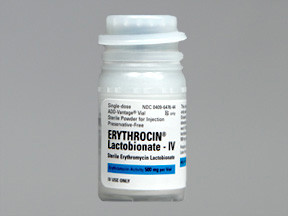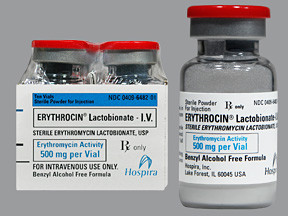ERYTHROMYCIN LACTOBIONATE - INTRAVENOUS
PHONETIC PRONUNCIATION: (eh-rith-row-MY-sin lack-toe-BYE-oh-nate)
COMMON BRAND NAME(S): Erythrocin
GENERIC NAME(S): erythromycin lactobionate
Uses
USES: This medication is an antibiotic given by vein (IV) to treat certain bacterial infections when medications cannot be taken by mouth. This medication is known as a macrolide (erythromycin-type) antibiotic. It works by stopping the growth of bacteria.
How to use ERYTHROMYCIN LACTOBIONATE - INTRAVENOUS
HOW TO USE: This medication is mixed in the correct fluid and given slowly into a vein as directed by your doctor, usually every 6 hours. Erythromycin may be given continuously or slowly over 20 to 60 minutes as separate doses at evenly spaced intervals. Dosage and length of treatment are based on your medical condition and response to therapy. You should use this injectable medication only until you are able to take an antibiotic by mouth or until your treatment is finished. If you are giving this medication to yourself at home, learn all preparation and usage instructions from your health care professional. Before using, check this product visually for particles or discoloration. If either is present, do not use the liquid. Learn how to store and discard medical supplies safely. For the best effect, use this antibiotic at evenly spaced times. To help you remember, use this medication at the same time(s) every day. Continue to use this medication until the full prescribed amount is finished, even if symptoms disappear after a few days. Stopping the medication too early may allow bacteria to continue to grow, resulting in a return of the infection. Tell your doctor if your condition persists or worsens.
Side Effects
Precautions
Interactions
Overdose
Images
Reviews
Faq for ERYTHROMYCIN LACTOBIONATE - INTRAVENOUS
Erythromycin lactobionate is an antibiotic used to treat various bacterial infections, including respiratory tract infections, skin and soft tissue infections, and certain types of gastrointestinal infections.
Erythromycin lactobionate works by inhibiting the growth of bacteria and preventing them from multiplying. It does this by interfering with the production of proteins necessary for bacterial growth.
The dosage of Erythromycin lactobionate for intravenous use depends on the type and severity of the infection being treated. It is typically administered as a slow infusion over 20-60 minutes, at a dose of 15-20 mg/kg every 6 hours.
Common side effects of Erythromycin lactobionate include stomach upset, diarrhea, nausea, vomiting, and abdominal pain. Less common but more serious side effects may include allergic reactions, liver problems, and irregular heart rhythms. It is important to report any severe or persistent side effects to your healthcare provider.
Erythromycin lactobionate is generally considered safe to use during pregnancy and breastfeeding, but it is always recommended to consult with a healthcare provider for personalized advice. They can weigh the potential benefits against any potential risks.
Erythromycin lactobionate may interact with certain medications, including digoxin, statins, warfarin, and certain anti-seizure medications. It is crucial to inform your healthcare provider about all the medications you are taking to avoid any potential interactions.
Erythromycin lactobionate should be stored at room temperature, away from moisture and heat. It should be kept out of reach of children and disposed of properly after use.
No, Erythromycin lactobionate is an antibiotic and is only effective against bacterial infections. It does not work against viral infections such as the flu or common cold.
The onset of action of Erythromycin lactobionate varies depending on the type and severity of the infection. Improvement in symptoms is usually seen within a few days of starting the treatment, but it is important to complete the full course as prescribed by your healthcare provider.
Disclaimer
IMPORTANT: HOW TO USE THIS INFORMATION: This is a summary and does NOT have all possible information about this product. This information does not assure that this product is safe, effective, or appropriate for you. This information is not individual medical advice and does not substitute for the advice of your health care professional. Always ask your health care professional for complete information about this product and your specific health needs.


No Reviews Yet